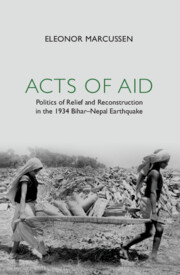Book contents
- Frontmatter
- Contents
- List of Illustrations
- List of Tables
- Acknowledgements
- List of Abbreviations
- Note on Transliteration
- 1 Introduction: Experiencing the Extraordinary and the Ordinary
- 2 Responses and Responsibilities in Emergency Relief
- 3 From Local to National Politics of Relief
- 4 Colonial Relations in Aid
- 5 Categories of Victims
- 6 Congested and Contested Spaces
- 7 Conclusion
- Glossary
- Bibliography
- Index
3 - From Local to National Politics of Relief
Published online by Cambridge University Press: 13 January 2023
- Frontmatter
- Contents
- List of Illustrations
- List of Tables
- Acknowledgements
- List of Abbreviations
- Note on Transliteration
- 1 Introduction: Experiencing the Extraordinary and the Ordinary
- 2 Responses and Responsibilities in Emergency Relief
- 3 From Local to National Politics of Relief
- 4 Colonial Relations in Aid
- 5 Categories of Victims
- 6 Congested and Contested Spaces
- 7 Conclusion
- Glossary
- Bibliography
- Index
Summary
Natural disasters occur in a political space.
Introduction: The Use and Abuse of Aid
According to the official narrative of the aftermath, as discussed in the previous chapter, the government’s ability to act swiftly was partly hampered by destroyed infrastructure and administrative chaos. Under these circumstances, the colonial government focused on security rather than mobilising personnel for rescue operations. As a result, the government’s organisational goals, preparedness and leadership in terms of organising disaster relief appeared limited and inadequate. It is in this space of weakened governance that Rajendra Prasad, with support from other leading INC members, began organising relief operations, resulting in the formation of the BCRC, a committee formed with the purpose of collecting funds and organising relief.
Disasters as exogenous shocks to which a political system must respond become political in their aftermath. The politicisation of the event tends to increase, rather than decrease, as the affected society moves from emergency response through recovery and reconstruction phases. As a part of the politicisation of the relief process, new organisational patterns often form to deal with the sudden disruption of a disaster. The BCRC was formed in response to the need for relief and built upon established networks of local politicians and relief organisations. This chapter addresses how political space and relief after natural disasters can be used for meeting political ends, arguing that for the INC, the BCRC served as a tool for nation-building and a practice in state formation where the Congress proved its ability to take on governance—even under extreme circumstances. The criticism of the colonial government was not directed at its incompetence and failure in disaster management, but at the systemic failure of the colonial governance in the Indian state. The BCRC, as a ‘non-political’ relief committee, carried out relief in the name of the nation, largely achieved by coordinating the work of a number of local, regional and national relief associations. In order to collect funds, as well as to coordinate and provide relief, the BCRC invoked a language of the nation that served its purpose to efficiently unite local relief associations with the wider networks of socially and politically active groups sympathetic towards the INC.
- Type
- Chapter
- Information
- Acts of AidPolitics of Relief and Reconstruction in the 1934 Bihar–Nepal Earthquake, pp. 97 - 154Publisher: Cambridge University PressPrint publication year: 2023
- Creative Commons
- This content is Open Access and distributed under the terms of the Creative Commons Attribution licence CC-BY-NC 4.0 https://creativecommons.org/cclicenses/



